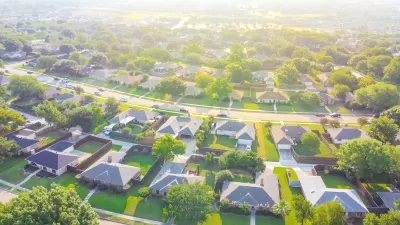As the housing affordability crisis spread from mainly coastal cities to the rest of the nation, cities and states are taking a serious look at outdated zoning codes that hamper efforts to build more housing.

Writing in Bloomberg CityLab, M. Nolan Gray and Salim Furth describe the wave of ‘YIMBY’ zoning reform sweeping the nation. From California to Rhode Island, states are taking a formerly local matter into their hands in an effort to alleviate the housing crisis.
“According to a new report from the Mercatus Center at George Mason University, more than 200 housing bills were introduced in at least 23 states. The shift follows the national spread of a housing affordability crisis once contained to the urban coasts.” Even usually reticent states like Montana passed sweeping reforms permitting more housing types. “Meanwhile, Florida legislators passed the Live Local Act, broadly preempting local zoning barriers to housing. The bill allows mixed-income housing — built to the highest allowable density in the municipality — in all commercial and industrial zones, as long as some of the units are reserved for workforce housing.”
It may take years to see the effects of zoning reform, but that doesn’t mean it doesn’t work. According to the authors, “The work pays off. California’s legislative focus on allowing ADUs has resulted in tens of thousands of newly permitted units, largely in areas off-limits to apartments.”
FULL STORY: What the YIMBY Winning Streak Means

Manufactured Crisis: Losing the Nation’s Largest Source of Unsubsidized Affordable Housing
Manufactured housing communities have long been an affordable housing option for millions of people living in the U.S., but that affordability is disappearing rapidly. How did we get here?

Americans May Be Stuck — But Why?
Americans are moving a lot less than they once did, and that is a problem. While Yoni Applebaum, in his highly-publicized article Stuck, gets the reasons badly wrong, it's still important to ask: why are we moving so much less than before?

Research Shows More Roads = More Driving
A national study shows, once again, that increasing road supply induces additional vehicle travel, particularly over the long run.

Judge Halts Enforcement of Anti-Homeless Laws in Grants Pass
The Oregon city will be barred from enforcing two ordinances that prosecute unhoused residents until it increases capacity and accessibility at designated camping sites.

Advancing Sustainability in Los Angeles County Schools
The Los Angeles County Office of Education’s Green Schools Symposium brings together educators, students, and experts to advance sustainability in schools through innovative design, climate resilience strategies, and collaborative learning.

Using Old Oil and Gas Wells for Green Energy Storage
Penn State researchers have found that repurposing abandoned oil and gas wells for geothermal-assisted compressed-air energy storage can boost efficiency, reduce environmental risks, and support clean energy and job transitions.
Urban Design for Planners 1: Software Tools
This six-course series explores essential urban design concepts using open source software and equips planners with the tools they need to participate fully in the urban design process.
Planning for Universal Design
Learn the tools for implementing Universal Design in planning regulations.
City of Moreno Valley
Institute for Housing and Urban Development Studies (IHS)
City of Grandview
Harvard GSD Executive Education
NYU Wagner Graduate School of Public Service
City of Cambridge, Maryland
Newport County Development Council: Connect Greater Newport





























